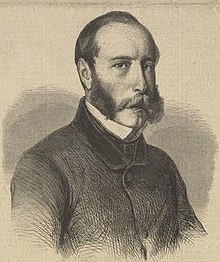Albert of Pourtalès
Albert Alexander Graf von Pourtalès (born September 10, 1812 in Paris , † December 18, 1861 ibid) was a Prussian diplomat and leading representative of the weekly newspaper party .
origin
Pourtalès came from an originally bourgeois French Huguenot family who had been ennobled under Frederick II . The family lived in Neuchâtel , which belongs to Prussia . His grandfather Jacob Ludwig Pourtalès (1722-1811) built up a considerable fortune there as a merchant and landowner. in 1814, Friedrich Wilhelm III. his three sons, including Friedrich von Pourtalès (1779–1861), Albert's father, in the Prussian counts. The father Count Friedrich was a real secret councilor and Prussian chief master of ceremonies, his mother Louise de Castellane-Norante (1793-1881) was a maid of honor and the daughter of the French lieutenant colonel Michel Ange Boniface Marquis de Castellane-Norante .
Live and act
After receiving appropriate training, Albert von Pourtalès entered the diplomatic service. He worked partly in the internal service of the Ministry of Foreign Affairs and partly in foreign missions. Until 1844 he was a diplomat in London , Naples and Constantinople . He then worked as a legation counselor in the ministry in Berlin until 1844. At the beginning of the March Revolution of 1848 he was involved in drawing up escape plans for Friedrich Wilhelm IV , but these were never carried out. He participated in the negotiations on the Malmö Armistice in 1848 .
From 1850 to 1851 Pourtalès was ambassador to Constantinople. Since then he has been in close contact with Christian Karl Josias von Bunsen . Like Pourtalès and his father-in-law Bethmann-Hollweg, he was one of the leading figures in the liberal-conservative weekly paper party.
During the Crimean War , Pourtalès pleaded that Prussia should bind itself to Great Britain and France . The aim was to achieve a stronger position for Prussia vis-à-vis Russia in foreign policy and to strengthen liberal currents domestically. During the war he was sent to London on a diplomatic mission in 1853. There he tried to represent the Prussian policy of "active neutrality". Since this was clearly directed against Austria-Hungary , the advance failed.
With regard to developments in Germany, Pourtalès took the position in 1853 that a military unit would be necessary through the supreme command of the troops of the German Confederation in Prussia. He proposed a permanent ministerial congress of the German states. The approval of military costs should go to a standing committee made up of representatives of the state parliaments.
Although there were substantial similarities in terms of content with regard to the Crimean War and the strategy with Prussia, Pourtalès was one of the harshest critics of Otto von Bismarck at this time and clearly recognized his increasingly functional relationship with the conservatives. “ Bismarck always needs and abuses his party comrades. They are mail horses for him, with which he drives to the next station. There is simply a Judas in his knightly hide, and I do not take a step with him. "
After the failure of the London mission, Pourtalès had to retire from the diplomatic service. A profound conflict between the king and his successor, the later Wilhelm I , also played a central role. He made trips to Switzerland and Venice . With the beginning of the New Era , he became envoy to Paris in 1859. He organized the visit of Wilhelm I to Napoleon III. His successor was Otto von Bismarck in 1862.
Pourtalès belonged to the Prussian manor house .
family
He married Anna von Bethmann-Hollweg (1827-1892) in Bonn in 1847, a daughter of the lawyer and later Minister Moritz August von Bethmann-Hollweg . The couple had two daughters:
Elisabeth (1847–1866)
Konstanze Josephine Mathilde Wilhelmine Helene (1849–1940) ⚭ 1868 Count Ferdinand von Harrach (1832–1915), painter
Individual evidence
- ↑ cit. based on Lothar Gall: Bismarck - The White Revolutionary, Ullstein, 2nd edition, 2002, ISBN 3-548-26515-4 , p. 162.
- ^ Gall, p. 164.
literature
- Felix Bamberg : Pourtalès, Albert Graf von . In: Allgemeine Deutsche Biographie (ADB). Volume 26, Duncker & Humblot, Leipzig 1888, pp. 492-494.
- Wolfgang Neugebauer : Pourtalès, Albert. In: New German Biography (NDB). Volume 20, Duncker & Humblot, Berlin 2001, ISBN 3-428-00201-6 , p. 664 ( digitized version ).
- Rolf Jordi: Oberhofen Castle. The rediscovery of a piece of history. Thun 2004.
Web links
| predecessor | Office | successor |
|---|---|---|
| Maximilian von Hatzfeldt-Trachenberg |
Prussian envoy in Paris 1859–1861 |
Otto von Bismarck |
| personal data | |
|---|---|
| SURNAME | Pourtalès, Albert of |
| ALTERNATIVE NAMES | Pourtalès, Albert Graf von (full name) |
| BRIEF DESCRIPTION | Prussian diplomat |
| DATE OF BIRTH | September 10, 1812 |
| PLACE OF BIRTH | Paris |
| DATE OF DEATH | December 18, 1861 |
| Place of death | Paris |
